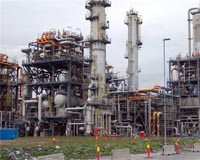 |
Caracas, Venezuela (UPI) Jul 31, 2009 Venezuela and Spain signed a series bilateral energy accords during Spanish Foreign Minister Miguel Angel Moratino's visit to Caracas this week. Contracts signed include a deal between Spain's Repsol YPF and Venezuelan state-owned PDVSA for oil exploration in the crude-rich Orinoco region. Venezuelan President Hugo Chavez said Martino's visit was "very important, very timely, refreshing and fortifying," adding that he welcomes other such agreements, the Latin American Herald Tribune reports. But the socialist president is increasingly expanding government control over oil, Venezuela's biggest industry. In May he ordered PDVSA to seize assets of 60 local and foreign oil service companies operating throughout the country. And his 2007 move to nationalize multibillion-dollar oil production projects in the Orinoco region was a blow to foreign oil giants operating there. Venezuela has said it produced more than 3 million barrels a day in 2008. According to OPEC, however, December's output was approximately 2.24 million barrels a day. Critics have said there has been a sharp slide in Venezuela's oil production. Chavez's nationalization measures increase "the risk of additional declines in oil production since PDVSA is not likely to be as efficient an operator of these business and assets as the private sector contractors," Goldman Sachs noted in a report. While the May seizures "might turn into an expedient and quick political solution to the current large payment arrears to suppliers, they might also entail large medium-term costs in terms of foregone production and overall loss of economic efficiency," the report said. Venezuela's economy is struggling, burdened by declining oil revenues and the mandates of Chavez's style of socialism, a panel of Venezuelan economist and analysts told the Voice of America this week. Economist Asdrubal Oliveros said Venezuela's oil industry is now sliding by almost 8 percent since its eight-fold gains of 2000 to 2008. It is oil revenues, he said, that Venezuela has relied on for the viability of Chavez's economic strategy of heavy social spending, coupled with increasing governmental control and industry regulation. Venezuelan native Moises Naim, editor of Foreign Policy magazine, said Chavez's strategy is like "hitting the brakes while also hitting the gas at the same time." Venezuela has also under invested in its oil industry, Naim said. "Venezuela today has the cheapest gasoline in the world. It is no surprise that gasoline consumption in Venezuela has gone through the roof. The more you consume domestically, the less is left for you to export," he said. Share This Article With Planet Earth
Related Links Powering The World in the 21st Century at Energy-Daily.com
 Southern China oil refinery moved over environment concern
Southern China oil refinery moved over environment concernGuangzhou, China (AFP) July 30, 2009 A controversial oil refinery project in southern China will be relocated after it was criticised by environmental groups, a senior Chinese official said Thursday. Wang Yang, Communist Party secretary of Guangdong province, said the joint venture between China's Sinopec and Kuwait Petroleum Corporation will be moved from its original location in Nansha. "The Nansha refinery project had ... read more |
|
| The content herein, unless otherwise known to be public domain, are Copyright 1995-2009 - SpaceDaily. AFP and UPI Wire Stories are copyright Agence France-Presse and United Press International. ESA Portal Reports are copyright European Space Agency. All NASA sourced material is public domain. Additional copyrights may apply in whole or part to other bona fide parties. Advertising does not imply endorsement,agreement or approval of any opinions, statements or information provided by SpaceDaily on any Web page published or hosted by SpaceDaily. Privacy Statement |